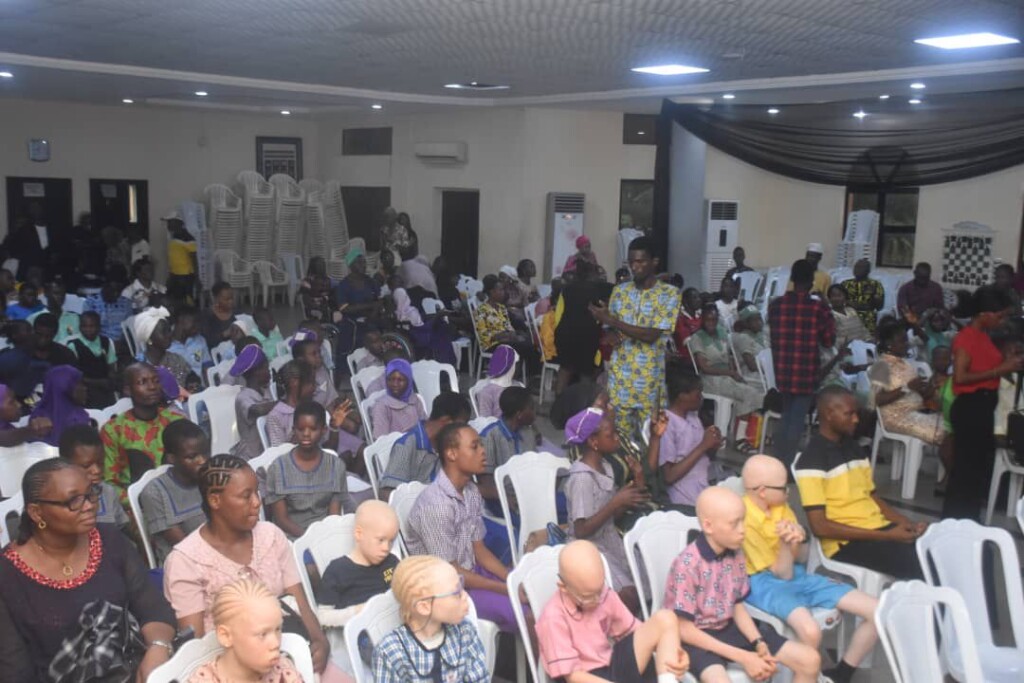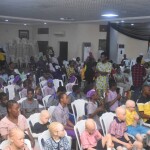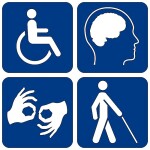Every day as the sun burns furiously through the torn ozone layer, its extreme heat aggravated by policy neglect roasts the ambition of many children with albinism in Nigeria
Gbenga Ogundare
Nifemi Olulana, 16 , and Abdullahi Ariyibi, 10, both share one passion in common – soccer. Although an ardent fan of English premier club Arsenal FC, Nifemi would like to be like his football idol C. Ronaldo when he grows up. Abdullahi, too, can’t wait to dazzle the world with the soccer wizardry that C. Ronaldo epitomises in football fame.
Yet, beyond their common fancy, both children have a mutual foe threatening their future soccer ambition – the scorching sun and its extreme heat brought about by climate change crises in Nigeria.
Nifemi and Abdullahi were born with albinism. And with average daytime temperatures in parts of Nigeria now soaring above 40°C during the dry season, climate change is forcing majority of the children to make a cruel choice: their health or their academic and sporting dreams. Their skin, lacking melanin, is highly vulnerable to UV radiation and its ravages.
Although both boys look forward to playing football with their mates everyday, that is often not possible because of the damage exposure to direct sunlight could do to their skins.
“He can only play football with his younger brother indoors,” Elizabeth Olulana, Nifemi’s mum, told ER.
Fearing sun ravages, his parents clear the sitting room just so he can play a little. It’s the family’s protective strategy for Nifemi and his three siblings who are also with albinism.
Not only that: the children are not allowed to participate in outdoor sports or activities, Elizabeth said. Even during school breaks, they must stay inside — isolated and restricted from engaging fully in extra-curricular activities alongside their peers.
That traumatises Nifemi all too often.
“In fact I got so angry once when I was hoping to play in a Cowbell football tournament in Lagos but was stopped by my parent,” the boy recalled. “The anger even grew worse when I found out that I could play better than the person playing in my wing while watching the tournament.”
Abdullahi, a student of Fadlu Raheem School in Ikotun, is not spared the restriction either. “I can’t play football at school because my dad has told me not to do so because of the sun,” he told ER.
The blow back of not accepting the forced restrictions is severe for any child with albinism. Amaka Odimegwu, another mother, recalled the harrowing experience of her daughter with albinism who chose sport over her skin health: “My daughter participated in inter-house sports practice. Afterwards, she came home with a severe sunburn on her face. It was so bad, I had to confront the school.”
Several other children like Nifemi and Abdullahi are barred — either by schools or their own families — from participating in extracurricular activities such as sports, field trips, or cultural dance practices that take place under the midday sun. The restriction, often justified as a precaution, then presents the children with deep psychological scars.
“When children are restricted from activities that their peers participate in, they may start to feel different or inferior’, Dr. Charles Umeh, consultant clinical psychologist and senior lecturer in the Department of Psychiatry, College of Medicine, University of Lagos, explained.
Abdullahi is already a victim. “I feel if I were like my other mates, I would be allowed to play football in the sun like they are doing’, he told ER, his voice laden with pain.
Ditto for Nifemi. He can’t stop being sad each time he misses an opportunity to participate in team sports like his mates. He finds succour in the assurance of his parents though. “My dad always supports me whenever I feel sad because I can't play ball with my friends. He would always say, "Nigerian weather does not support you playing football, but one day when we travel to London, I’ll enrol you in Arsenal's academy.”
Yet, clinical psychologist Umeh warns of more mental impacts: “They may internalise the message that they are fragile, incapable and not good enough, which can erode their confidence. This then leads to low self-esteem and low sense of self-worth.”
The effects on the children can even be grimmer, warned Umeh. As the isolation from group activities trigger feelings of being ‘othered’ and scars their self-esteem, the potential for depression, withdrawal, or even self-harm thus become real for children with albinism in Nigeria, he explained.
That is neither here nor there for Tolani Ojuri, the Lagos Albinism Association of Nigeria (AAN) chairman. The restriction of children with albinism must remain regardless. “And if we find any school or anyone allowing them to participate in team sports under the midday sun, we will go after them,” he said.
According to Ojuri, the passion of albino children for outdoor sports is creating a festering health problem for the association already. “We now have individuals in their adult years who now need urgent cancer surgery because they chose to follow their passion for sport in the sun while they were children.”
The Hidden Toll
For her daughter’s damaged skin, Amaka got a profuse apology from the school as compensation. But the systemic neglect and lack of safeguards to protect children with albinism in Nigeria’s public and private schools received no attention.
This neglect by policymakers and education authorities violates the Child Rights Act 2003 which has been domesticated by most states. Specifically, Section 1 of the Act emphasises that the best interests of the child should be of paramount consideration in all actions concerning children.
In the Lagos State Special People’s Law (2011), Section 26(11), on the rights of children with disabilities, states:
“In all matters concerning children living with disability, the best interests of the child shall be the primary consideration.”
Had the authorities kept this provision, they would have created reasonable accommodations to address the special needs of pupils with albinism in both curricular and extra-curricular school activities. But all the schools ER visited in Lagos lack indoor recreational facilities where children with albinism can participate without breaching their skin health.
A World Bank Group news report shows this reasonable accommodation only requires little adjustments though. The Félix Estéban Oller High School on the Nargana Island in Panama is a case study. The school authorities, with the help of the SOS Albino, only roofed the gym to enable its Albino children play alongside others.
The Lagos Office for Disability Affairs (LASODA) did not respond to ER question on this reasonable accommodation for school children with albinism. LASODA, though, caters to inclusion of PWDs in the state-level sporting affairs.
Ojuri equally insisted it is not possible for LASODA.
His argument is not for want of indoors sports—like table tennis, basketball, and others that can engage the children. Nor is for any impact on the best interest of such children — the feeling of ‘otherness’ that buffets Nifemi, and the provision of the Child Act and the disability laws.
“I doubt if any school, including the federal government colleges, anywhere in Nigeria has that kind of facilities for pupils with albinism,” Ojuri said.
However, he was quick to reveal the regular provision of sunscreen, wide-brimmed hats and UV-protective umbrellas LASODA freely distributes to AAN's members.
Get The Hell Inside!
Away from the playground, the heat stress remains an everyday reality notwithstanding. Both for the Olulana children, and other pupils with albinism.
The past few months before the arrival of the rains in June had been hellish for the four siblings. They had to stay away from school sometimes because of rising temperature. Burns and rashes afflict their skins, Elizabeth, their mother, laments.
Sunscreens, essential for their protection, come at a steep price: ₦15,000 per tube. With four children needing about eight tubes monthly (costing ₦120,000), the financial strain is devastating for the family. And when money runs out, the children are forced to rely solely on additional clothing for protection.
Even with these precautions, they endure discomfort from the heavy protective gear which often make it difficult to focus during lessons.
“They lose concentration because of the discomfort,” Elizabeth explained. “
“Since January, they’ve missed at least six days of school due to unbearable heat. It affects their grades.”
And when attendance becomes unavoidable, …“we go very early to school before the sun is high, and have to wait hours after closing before it’s safe to go home," Elizabeth said.
Although Dr. Folakemi Cole-Adeife, Consultant Dermatologist at the Lagos State University Teaching Hospital (LASUTH), is of the view that government should prioritise the provision of free sunscreen for children with albinism, “there’s no national policy mandating free or subsidised sunscreen for school children with albinism,” Bisi Bamishe, president, AAN, said.
Holes in the Policy
It is an everyday dilemma for all of the albino children ER interviewed. They lament their experience of persistent itching, heat rashes, and difficulty concentrating during lessons — symptoms worsened by their inability to tolerate prolonged sun exposure or harsh lighting.
Classrooms lack basic ventilation, and cooling systems like fans or air conditioners are either absent or non-functional, ER discovered in its visits across many public and private schools in Lagos State.
They have an alternative though: to leave the classrooms windows open to allow for fresh air. Ironically, that is not viable for children with albinism. “Their eyes are extremely sensitive to bright light, especially sunlight,” explained Ojuri. “Throwing open the windows may cool the room, but it causes visual discomfort and worsens their sight problems.”
Such discomfort could be averted actually, especially with UV-protective blinds covering classroom windows. But for over a decade now, the National Policy on Albinism has remained a lame duck, with little political will to activate its recommendations — including school-friendly infrastructure, early skin screenings, and inclusive health insurance coverage.
For instance, the federal government and many states are yet to see the sense in directing public schools to allow children with albinism modify their uniforms, a policy urgently needed, according to Dr. Cole-Adeife. “Albino children need to have their uniforms modified to protect their skin from the sun so as to prevent skin cancer. Shorts should be trousers. Shirts should be long sleeves, not short. And they must have hats as part of their uniform to protect their face and neck from the sun.”
Global Warming, Local Bumbling
While climate action remains a global priority, Nigeria’s national climate adaptation strategy has not integrated the specific vulnerabilities of children with albinism. In many parts of the country, for instance, school-based heat adaptation strategies exist only on the pages of policy documents. No one is thinking about funding for infrastructural improvement such as working ceiling fans or affordable cooling systems.
At the moment, Nigeria has one of the highest incidences of skin cancer among people with albinism in sub-Saharan Africa, with children starting to show pre-cancerous lesions as early as age 10. In addition, most people with albinism in Nigeria die from skin cancer before age 40, according to a UN study.
So while policymakers dawdle, extreme heat and prolonged UV exposure continue to take its toll on the overlooked children.






